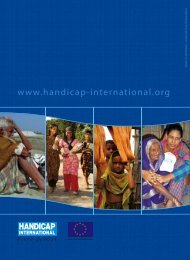Full page photo print - Harvard Law School Project on Disability
Full page photo print - Harvard Law School Project on Disability
Full page photo print - Harvard Law School Project on Disability
Create successful ePaper yourself
Turn your PDF publications into a flip-book with our unique Google optimized e-Paper software.
human rights. They must adopt laws and policies that promote human rights. They must<br />
develop programs and take other measures to implement these rights. They must allocate the<br />
necessary resources to enforce laws and fund programmatic efforts.<br />
General comment: A written statement by the committee that m<strong>on</strong>itors a UN treaty (e.g.,<br />
committee <strong>on</strong> ec<strong>on</strong>omic, social and cultural Rights) advising States Parties how best to<br />
fulfill their obligati<strong>on</strong>s under that treaty. They also analyze and interpret the meaning, c<strong>on</strong>tent<br />
and scope of a treaty.<br />
Habilitati<strong>on</strong>: Effective and appropriate measures aimed to help people attain and maintain<br />
maximum independence and full inclusi<strong>on</strong> and participati<strong>on</strong> in all aspects of life and for the<br />
benefit of people who are born with a disability or acquire a disability at an early age, to<br />
empower them to reach their full potential as they learn and grow. By c<strong>on</strong>trast, rehabilitati<strong>on</strong><br />
refers to re-gaining and maintaining maximum independence and full inclusi<strong>on</strong> after acquiring<br />
a disability or a change in <strong>on</strong>e’s disability.<br />
Human Rights committee: The body of independent experts that m<strong>on</strong>itors implementati<strong>on</strong> of<br />
the Internati<strong>on</strong>al covenant <strong>on</strong> civil and political Rights by its states parties.<br />
Inalienable: Refers to the principle that human rights bel<strong>on</strong>g to every pers<strong>on</strong> and cannot be<br />
taken from a pers<strong>on</strong> under any circumstances. Human rights automatically bel<strong>on</strong>g to each<br />
human being. They are not given to people by their government or any other authority, nor can<br />
they can be taken away.<br />
Inclusive educati<strong>on</strong>: The educati<strong>on</strong> of all children, youth and adults - with and without<br />
disabilities - in the general educati<strong>on</strong> system of their community. Inclusi<strong>on</strong> involves having<br />
access to educati<strong>on</strong> with appropriate networks of support and changing the policies, practices,<br />
and attitudes within the school system to remove barriers to their learning.<br />
Independent living movement: Part of global advocacy for disability rights, the independent<br />
living movement is based <strong>on</strong> the premise that any pers<strong>on</strong> with disabilities should have the<br />
choice of living in the community. This can be accomplished through the creati<strong>on</strong> of pers<strong>on</strong>al<br />
assistance services allowing an individual to manage his or her pers<strong>on</strong>al care, to keep a home,<br />
to have a job, go to school, worship, and otherwise participate in the life of the community.<br />
Indivisible: Refers to the principle that each human right is of equal importance. A pers<strong>on</strong><br />
cannot be denied a right because some<strong>on</strong>e decides it is “less important” or “n<strong>on</strong>essential.”<br />
Informed c<strong>on</strong>sent: Refers to the process by which a pers<strong>on</strong> is provided with the informati<strong>on</strong><br />
necessary to fully participate in decisi<strong>on</strong>s about his or her health care. Based <strong>on</strong> a patient’s<br />
right to direct what happens to his or her body and the ethical duty of the physician to involve<br />
the patient in decisi<strong>on</strong>-making.<br />
Inherent: Principle that human rights are a natural part of who you are. The text of Article 1 of<br />
the universal Declarati<strong>on</strong> of Human Rights (UDHR) begins “All human beings are born free<br />
and equal in dignity and rights.”<br />
Instrument: A formal, written, official document, such as a treaty or declarati<strong>on</strong>, in which a<br />
State expresses its intenti<strong>on</strong> to uphold certain human rights principles or norms. May be legally<br />
binding or n<strong>on</strong>binding. May be global, regi<strong>on</strong>al, or nati<strong>on</strong>al.<br />
Integrated educati<strong>on</strong>: Placing children with disabilities in the general educati<strong>on</strong> system<br />
with the expectati<strong>on</strong> that they adapt or “fit in” to the existing system and culture and without<br />
providing necessary supports and removing barriers to their learning; differs from inclusive<br />
302 HumAn RIGHts. yes! ActI<strong>on</strong> AnD ADvocAcy <strong>on</strong> tHe RIGHts oF peRs<strong>on</strong>s wItH DIsAbIlItIes




